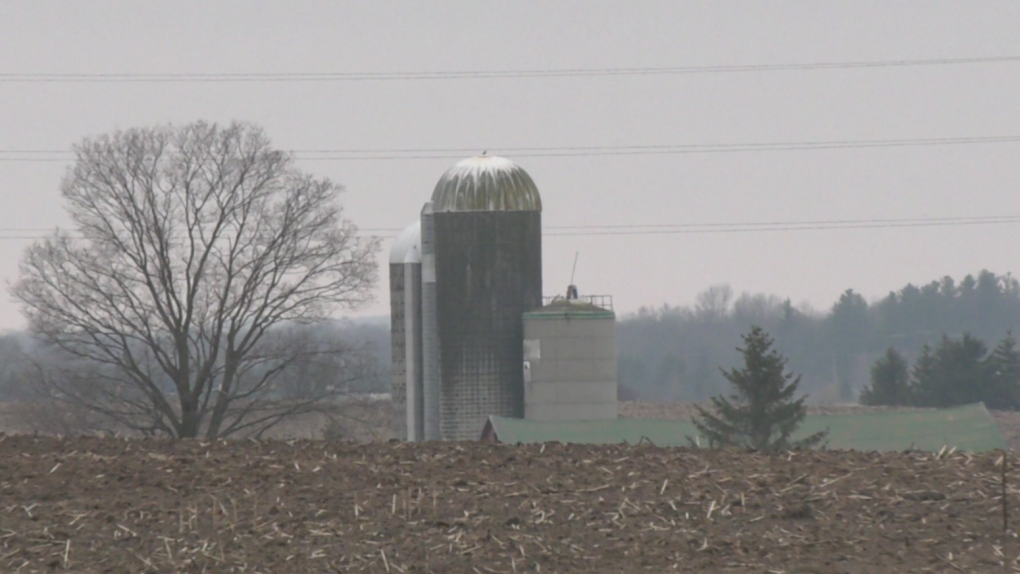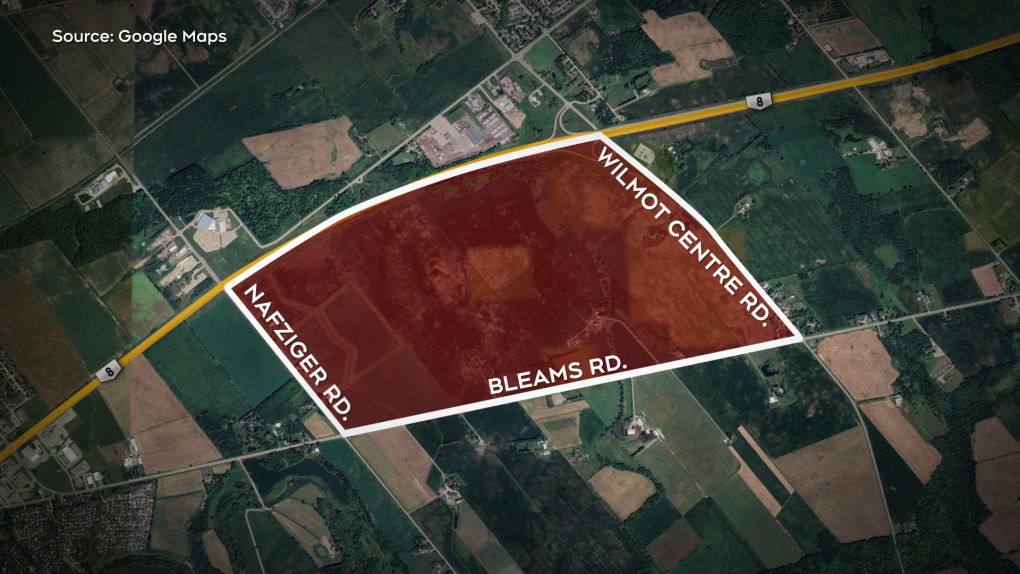Waterloo Region secures one third of Wilmot property marked for future investment
The Region of Waterloo is making good progress on its plan to assemble shovel-ready land in Wilmot Township.
On Thursday, the region announced they’ve purchased one-third of the 770 acres previously identified as prime property for future projects.
They said securing shovel-ready land for large-scale employers is the key to the region’s future growth. Those opportunities, they insist, will bring in well-paying jobs and billions of dollars for the local economy.
“We calculate we’ve missed about $4.1 billion of investment, which has gone somewhere else because we did not have a shovel-ready large piece of land,” explained Regional Chair Karen Redman.
She pointed to two specific instances where Waterloo Region fell short.
“One was the Ontario Jobs Challenge, when we learned that we weren't in the running if we didn't have a mega-site. And the second was being on the land bank, which is a list that the provincial government takes around when it's marketing Ontario [globally]. We're not on that list, and we should be because we're missing international investment and talent."
The region said they don’t have an investor waiting in the wings for the Wilmot property.
"Right now we don't have an end user or a partner in mind,” Redman confirmed.
Part of the push to bring in new employers is the expected population boom. The latest figures show Waterloo Region could reach one million residents by 2051.
“That may seem far away [but] the reality is the growth is already happening and visionary projects like this land assembly [are] so that we can attract international talent and investment.”
One example of that, Redman explained, is the introduction of light rail transit.
“We now have $5 billion of investment as a result of that vision. We can either shape the growth that is happening or we can react to it.”
 Farm land in Wilmot Township on April 4, 2024. (Chris Thomson/CTV Kitchener)
Farm land in Wilmot Township on April 4, 2024. (Chris Thomson/CTV Kitchener)
Farmers respond
The land purchase has become a contentious issue in Wilmot. In response to the region’s push to buy 770 acres, local farmers have banded together to fight against expropriation.
Alfred Lowrick, who represents the Fight for Farmland group, said the region’s claim that they’ve purchased one-third of the land isn’t accurate. He’s only aware of three residential properties that have been sold, for a total of 167.3 acres.
“If you do the math, it comes out to about 21.7 per cent. I don’t know how that gets to 33 per cent, but I guess that’s the regional math.”
He said some of the affected landowners have not been negotiating with the region.
“They were all around the table [Thursday] morning, none of them said they sold. We were all looking at it strategically. ‘What is going to be the next step?’”
 A map shows the land the Region of Waterloo wants to buy. (Graphic by Hayden Phillips/CTV Kitchener)
A map shows the land the Region of Waterloo wants to buy. (Graphic by Hayden Phillips/CTV Kitchener)
Lowrick said the group is looking at taking legal action, especially after the region rejected all of their Freedom of Information requests. They are now waiting to see how the township responds.
“We are appealing to the Ombudsman and the Privacy Commissioner,” he explained. “Also looking at other legal action. We’re doing this for the residents of the community.”
Redman, meanwhile, said the region is working towards a resolution.
“I understand that [it’s] frustrating for some people,” she admitted. “We have always been focused on, and will continue to focus on, fair and equitable outcomes for the landowners.”
Why Wilmot was chosen
The region said the land, between Nafziger Road, Bleams Road and Wilmot Centre Road, met their site selection criteria, including its proximity to arterial transportation (Highway 7/8), as well as existing hydro, water and wastewater infrastructure. Another important consideration was that the land was outside the Regional Recharge Zone (which protects drinking water) and the grading was consistent throughout the area.
Now that some of the land has been secured, further technical analysis and environmental work is underway.
“We’re doing some more due diligence,” Redman explained. “There’s been due diligence all along when we settled on this piece of land, but there will be further investigation.”
CTVNews.ca Top Stories

Poilievre writes to GG calling for House recall, confidence vote after Singh declares he's ready to bring Liberals down
Conservative Leader Pierre Poilievre has written to Gov. Gen. Mary Simon, imploring her to 'use your authority to inform the prime minister that he must' recall the House of Commons so a non-confidence vote can be held. This move comes in light of NDP Leader Jagmeet Singh publishing a letter stating his caucus 'will vote to bring this government down' sometime in 2025.
BREAKING At least 2 dead and 60 hurt after a car drives into a German Christmas market in a suspected attack
A car plowed into a busy outdoor Christmas market in the eastern German city of Magdeburg on Friday, killing at least two people and injuring at least 60 others in what authorities suspect was an attack.
Judge sentences Quebecer convicted of triple murder who shows 'no remorse'
A Quebecer convicted in a triple murder on Montreal's South Shore has been sentenced to life in prison without chance of parole for 20 years in the second-degree death of Synthia Bussieres.
'I understand there's going to be a short runway,' new minister says after Trudeau shuffles cabinet
Prime Minister Justin Trudeau added eight Liberal MPs to his front bench and reassigned four ministers in a cabinet shuffle in Ottawa on Friday, but as soon as they were sworn-in, they faced questions about the political future of their government, and their leader.
Fake nurse Brigitte Cleroux sentenced for B.C. crimes
A woman who impersonated nurses in several provinces has been sentenced to seven years in prison for offences in British Columbia – where she illegally treated nearly 1,000 patients across multiple communities.
Poilievre to Trump: 'Canada will never be the 51st state'
Conservative leader Pierre Poilievre is responding to U.S. president-elect Donald Trump’s ongoing suggestions that Canada become the 51st state, saying it will 'never happen.'
Toronto officials warn of possible measles exposure at Pearson airport
Toronto Public Health (TPH) is advising of another possible measles exposure at Canada’s largest airport.
Bail denied for Winnipeg woman accused of killing animals in online videos
Warning: This story contains disturbing details. Discretion is advised. A Winnipeg woman accused of making videos of animals being tortured and killed that were sold on the dark web was denied bail.
Party City closing in U.S., Canadian stores remain 'open for business'
The impending closure of all Party City locations in the United States will not extend into Canada.
































